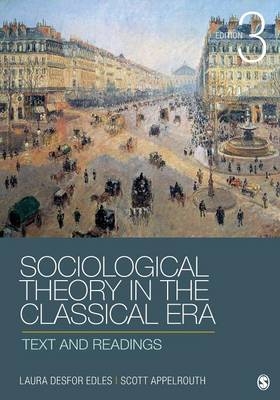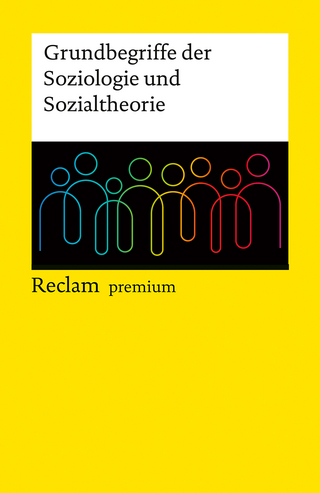
Sociological Theory in the Classical Era
SAGE Publications Inc (Verlag)
978-1-4522-0361-4 (ISBN)
- Titel erscheint in neuer Auflage
- Artikel merken
Trained at UCLA and at NYU respectively, Laura Desfor Edles and Scott Appelrouth were frustrated by their inability to find a sociological theory text that could inspire enthusiasm in undergraduate students while providing them with analytical tools for understanding theory and exposing them to original writings from pivotal theorists. They developed this widely used text/reader to fill that need.
This affordable ′hybrid′ text introduces students to original major writings from sociology′s key classical theorists as well as from a variety of other voices, and also provides a helpful theoretical and historical framework, written by the editors, with which to understand those often intimidating readings. In addition to presenting a unique format, this book is one of the only theory texts to feature photos and diagrams, making it even more student friendly.
New to this edition:
Chapter 1 has been is significantly revised, to better explain the intellectual, political, cultural, and economic origins of sociological theory. The authors have added new material on the Enlightenment, the Industrial Revolution, and the French Revolution.
Dated examples have been removed and replaced by newer, more timely applications of classical theory to contemporary social life.
The authors have developed 10 new conceptual diagrams to illustrate complex ideas.
Many of introductions to readings have been revised to add new insights and historical context.
All chapters have new discussion questions.
Laura Desfor Edles (PhD, University of California, Los Angeles, 1990) is Professor of Sociology at California State University, Northridge. She is the author of Symbol and Ritual in the New Spain: The Transition to Democracy after Franco (1998) and Cultural Sociology in Practice (2002), as well as various articles on culture, theory, race/ethnicity, and social movements. Scott Appelrouth (PhD, New York University, 2000) is Professor of Sociology at California State University, Northridge. His interests include sociological theory, cultural sociology, and social movements. He has taught classical and contemporary theory at both the graduate and undergraduate levels, and has published several articles in research- and teaching-oriented journals on social movements, theory, and the controversies over jazz during the 1920s and rap during the 1980s. His current research focuses on political discourse in American party platforms.
1. Introduction
WHAT Is Sociological Theory?
WHY Read Original Works?
WHO Are Sociology’s Core Theorists?
HOW Can We Navigate Sociological Theory?
DISCUSSION QUESTIONS
2. Karl Marx
A Biographical Sketch
Intellectual Influences and Core Ideas
Significant Others—Thorstein Veblen: The Leisure Class and Conspicuous Consumption
Marx’s Theoretical Orientation
Significant Others—Antonio Gramsci: Hegemony and the Ruling Ideas
READINGS
Introduction to The German Ideology
From The German Ideology (1845–1846)
Introduction to Economic and Philosophic Manuscripts of 1844
From Economic and Philosophic Manuscripts of 1844
Introduction to The Communist Manifesto
From The Communist Manifesto (1848)
Introduction to Capital
From Capital (1867)
Introduction to Friedrich Engels’s The Origin of the Family, Private Property and the State
From The Origin of the Family,Private Property and the State (1884)
DISCUSSION QUESTIONS
3. Émile Durkheim
A Biographical Sketch
Intellectual Influences and Core Ideas
Significant Others—Auguste Comte: The Father of “Social Physics”
Significant Others—Herbert Spencer: Survival of the Fittest
Durkheim’s Theoretical Orientation
READINGS
Introduction to The Division of Labor in Society
From The Division of Labor in Society (1893)
Introduction to The Rules of Sociological Method
From The Rules of Sociological Method (1895)
Introduction to Suicide: A Study in Sociology
From Suicide: A Study in Sociology (1897)
Introduction to The Elementary Forms of Religious Life
From The Elementary Forms of Religious Life (1912)
DISCUSSION QUESTIONS
4. Max Weber
A Biographical Sketch
Intellectual Influences and Core Ideas
Significant Others—Friedrich Nietzsche: Is God Dead?
Significant Others—Robert Michels: The Iron Law of Oligarchy
Weber’s Theoretical Orientation
READINGS
Introduction to The Protestant Ethic and the Spirit of Capitalism
From The Protestant Ethic and the Spirit of Capitalism (1904)
Introduction to “The Social Psychology of the World Religions”
From “The Social Psychology ofthe World Religions” (1915)
Introduction to “The Distribution of Power Within the Political Community: Class, Status, Party”
“The Distribution of Power Within the Political Community: Class, Status, Party” (1925)
Introduction to “The Types of Legitimate Domination”
From “The Types of Legitimate Domination” (1925)
Introduction to “Bureaucracy”
From “Bureaucracy” (1925)
DISCUSSION QUESTIONS
5. Charlotte Perkins Gilman
A Biographical Sketch
Significant Others—Harriet Martineau: The First Woman Sociologist
Intellectual Influences and Core Ideas
Gilman’s Theoretical Orientation
READINGS
Introduction to “The Yellow Wallpaper”
“The Yellow Wallpaper” (1892)
“Why I Wrote ‘The Yellow Wallpaper’”
Introduction to Women and Economics
From Women and Economics (1898)
DISCUSSION QUESTIONS
6. Georg Simmel
A Biographical Sketch
Intellectual Influences and Core Ideas
Significant Others—Ferdinand Tönnies: Gemeinschaft and Gesellschaft
Simmel’s Theoretical Orientation
READINGS
Introduction to “Exchange”
From “Exchange” (1907)
Introduction to “Conflict”
From “Conflict” (1908)
Introduction to “Sociability”
From “Sociability” (1910)
Introduction to “The Stranger”
“The Stranger” (1908)
Introduction to “Fashion”
From “Fashion” (1904)
Introduction to “The Metropolis and Mental Life”
“The Metropolis and Mental Life” (1903)
DISCUSSION QUESTIONS
7. W. E. B. Du Bois
Significant Others—Anna Julia Cooper: A Voice from the South
A Biographical Sketch
Intellectual Influences and Core Ideas
Du Bois’s Theoretical Orientation
READINGS
Introduction to The Philadelphia Negro
From The Philadelphia Negro (1899)
Introduction to The Souls of Black Folk
From The Souls of Black Folk (1903)
Introduction to “The Souls of White Folk”
From “The Souls of White Folk” (1920)
DISCUSSION QUESTIONS
8. George Herbert Mead
A Biographical Sketch
Intellectual Influences and Core Ideas
Significant Others—Charles Horton Cooley: The “Looking-Glass Self”
Significant Others—William James: Consciousness and the Self
Mead’s Theoretical Orientation
READINGS
Introduction to “Mind”
“Mind” (1934)
Introduction to “Self”
“Self” (1934)
Introduction to “Society”
“Society” (1934)
DISCUSSION QUESTIONS
| Verlagsort | Thousand Oaks |
|---|---|
| Sprache | englisch |
| Maße | 177 x 254 mm |
| Gewicht | 800 g |
| Themenwelt | Sozialwissenschaften ► Soziologie ► Allgemeines / Lexika |
| ISBN-10 | 1-4522-0361-X / 145220361X |
| ISBN-13 | 978-1-4522-0361-4 / 9781452203614 |
| Zustand | Neuware |
| Haben Sie eine Frage zum Produkt? |
aus dem Bereich



